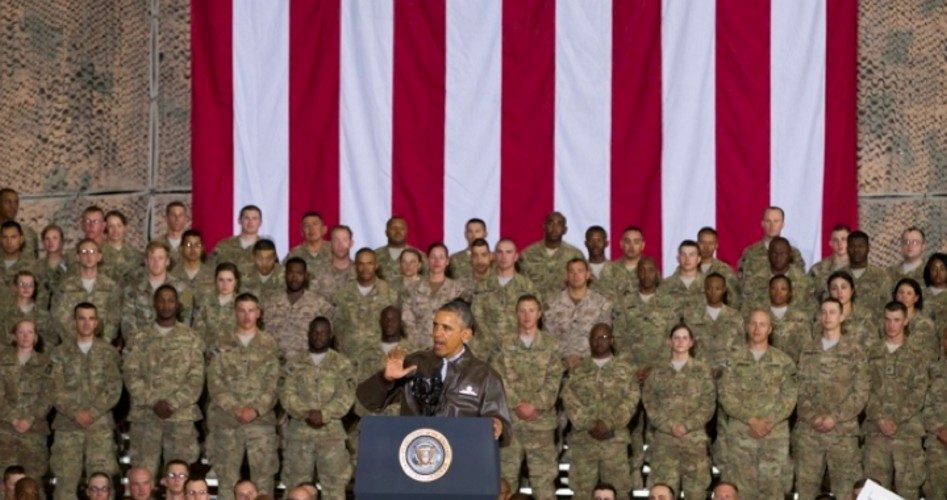
The chief of CIA operations in Kabul was identified Saturday when a White House list of U.S. officials taking part in President Obama’s surprise Memorial Day visit to U.S. troops in Afghanistan was released to the press. Including the official’s name was apparently done by mistake, as the White House quickly issued a revised list that did not include the officer. But the original list had already gone out to reporters traveling with the president and was included in a “pool report” shared with both U.S. and foreign news organizations. The individual named was identified as “Chief of Station” in Kabul, a title used by the CIA to designate its highest-ranking official in a country. Press officials distributed the report to 6,000 recipients, the Washington Post reported.
Scott Wilson, the Post’s White House bureau chief, filed the pool report before noticing the unusual reference to the chief of station and asked White House press officials in Afghanistan if they had intended to include the name. The list was prepared by military officials for distribution to reporters, the Post said. The paper withheld the name at the request of the White House, due to fears the officer and his family might be endangered by its publication. Both the White House and the CIA declined to comment on how or why the name was included on the list.
The incident may further complicate an awkward relationship between the CIA and Obama, who promised an end to the agency’s “enhanced interrogation” (read: torture) of terror suspects as a candidate for president in 2008. Once in the White House, he ordered an end to the harsh treatment of prisoners, but expressed reluctance at prosecuting those who may have violated U.S. laws and international treaties against torture. In a pre-inauguration interview with ABC’s George Stephanopoulos, Obama spoke of the need to “look forward as opposed to looking backwards.”
“And part of my job,” he said, “is to make sure that, for example, at the CIA, you’ve got extraordinarily talented people who are working very hard to keep Americans safe. I don’t want them to suddenly feel like they’ve got spend all their time looking over their shoulders.”
In 2012, Attorney General Eric Holder announced the closing without charges of the only two cases under investigation relating to the U.S. torture program: one that resulted in the 2002 death of an Afghan detainee at a secret CIA prison near Kabul, and the other in the 2003 death of an Iraqi citizen while in CIA custody at Abu Ghraib.
Recently the administration has been caught in a feud between the CIA and the Senate Intelligence Committee, chaired by Dianne Feinstein (D-Calif.), a key Obama ally. Feinstein charged the agency with illegal searches of computers used by the committee in developing its 6,600-page report on waterboarding and other abuses of prisoners in CIA custody. The CIA has charged the committee with illegal use of classified material. The Justice Department is said to be reviewing the competing criminal charges.
The report concludes that the agency tortured suspects and gained little in valuable intelligence, leaving in Feinstein’s words a “stain on our history that must never be allowed to happen again.” The agency’s defenders have charged that the report, written by the committee’s Democratic staff, was completed without interviews of former Bush officials who authorized the “enhanced interrogation” methods and supervised their use in “black site” prisons overseas.
“Neither I or anyone else at the agency who had knowledge was interviewed,” Jose Rodriguez, the CIA’s chief clandestine officer in the mid-2000s, told the Associated Press. “They don’t want to hear anyone else’s narrative,” said Rodriguez, who had operational oversight over the detention and interrogation program. The Senate report is “an attempt to rewrite history,” he said.
The Senate panel voted to make the report public, subject to the blocking out of information that would compromise national security. Though Feinstein asked the White House to take on that task, Obama has turned the editing of the report over to the CIA. Feinstein and other senators have called that a conflict of interest. The CIA has said its review would take several months and could not be completed within 30 days as requested by the committee.
While visiting with troops at Bagram Airfield, Obama praised them as “real heroes and pledged to bring a responsible end to the 13-1/2-year-old war, the longest in American history. While U.S. combat units are scheduled to be withdrawn by December of this year, some American troops will remain to assist Afghan security forces if the Kabul government signs on to a new security agreement between the two countries, authorizing the extended presence of U.S. troops. The agreement was ratified by the country’s grand assembly, called the loya jirga, last year but President Hamid Karzai refused to sign it as long as American troops continue to raid Afghan homes in search of high-profile insurance. Obama told the troops he hoped the new president, to be chosen in next month’s run-off election, would sign the agreement.
This final draft of the agreement said it would take effect on January 1, 2015 and “remain in force until the end of 2024 and beyond,” unless terminated by mutual consent or by a two-year notice by either party. It omitted the language previously submitted by Afghan negotiators that said: “No detention or arrest shall be carried out by the United States forces. The United States forces shall not search any homes or other real estate properties.”
Photo of President Obama in Afghanistan, May 25, 2014: AP Images



